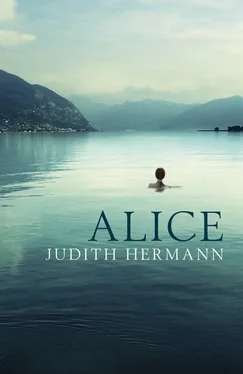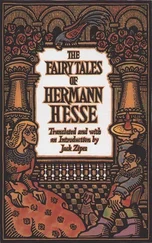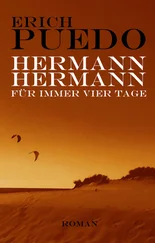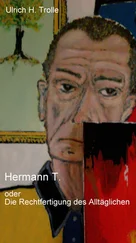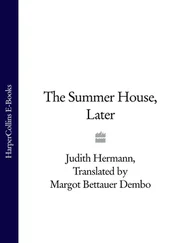Judith Hermann - Alice
Здесь есть возможность читать онлайн «Judith Hermann - Alice» весь текст электронной книги совершенно бесплатно (целиком полную версию без сокращений). В некоторых случаях можно слушать аудио, скачать через торрент в формате fb2 и присутствует краткое содержание. Год выпуска: 2011, Издательство: Clerkenwell, Жанр: Современная проза, на английском языке. Описание произведения, (предисловие) а так же отзывы посетителей доступны на портале библиотеки ЛибКат.
- Название:Alice
- Автор:
- Издательство:Clerkenwell
- Жанр:
- Год:2011
- ISBN:нет данных
- Рейтинг книги:3 / 5. Голосов: 1
-
Избранное:Добавить в избранное
- Отзывы:
-
Ваша оценка:
- 60
- 1
- 2
- 3
- 4
- 5
Alice: краткое содержание, описание и аннотация
Предлагаем к чтению аннотацию, описание, краткое содержание или предисловие (зависит от того, что написал сам автор книги «Alice»). Если вы не нашли необходимую информацию о книге — напишите в комментариях, мы постараемся отыскать её.
Alice — читать онлайн бесплатно полную книгу (весь текст) целиком
Ниже представлен текст книги, разбитый по страницам. Система сохранения места последней прочитанной страницы, позволяет с удобством читать онлайн бесплатно книгу «Alice», без необходимости каждый раз заново искать на чём Вы остановились. Поставьте закладку, и сможете в любой момент перейти на страницу, на которой закончили чтение.
Интервал:
Закладка:
IV. Malte
It was raining the day Alice saw Frederick for the first and only time. A light rain but steady — diagonal lines against the winter sky. Mid-November. Frederick had said he was coming to Berlin anyway; he hadn’t picked this weather for their meeting; neither had Alice, although it was the sort of weather that made her feel good. Reason enough to feel sleepy and lethargic, rain enough for an umbrella. As usual, her car was parked far away, umpteen streets away, at the edge of the district. Alice left the house too early, carrying an umbrella, wearing high heels, a grey coat, her bag slung over one shoulder, and feeling as if she were dressed for a state visit. On a whim, Frederick had taken a hotel room in the centre of the city, right by the river. Alice thought of it as a whim, but it might simply have been practical, a room downtown. With a view of the water and a steel bridge with pigeons nesting in its struts and trains rolling across from east to west and back. Milky green water with shimmering streaks of oil. The beautiful River Spree, its rusty freight barges, excursion boats, shabby tugboats, everything the same today as it had been forty years ago. Maybe Frederick chose the location because of that.
Alice was to pick him up at the hotel, around eleven.
In your room?
In the lobby. Not in the room. I’ll come down to the lobby.
She didn’t know exactly how old Frederick was. About seventy, a miracle actually that he was still around; he could have been gone by now; that would have been more likely. She had phoned him. He had answered the phone. This startled her so much she almost hung up. His voice sounded low and soft. Not frail. But soft. She took a deep breath. Hello, my name is Alice, she said. We don’t know each other, but I’m Malte’s niece.
For a moment Frederick said nothing. Then he asked how she got hold of his phone number, his voice neither friendly nor unfriendly, matter-of-fact.
From the phone book, Alice had said. It was the truth.
In that moment, during which he said nothing, in that very short stretch of time, Alice knew that her call had forced Frederick to think back over almost forty years — whether he wanted to or not. Back through all the ups and downs, back to the day his friend Malte had taken his own life. Was that hard for him? With her phone call Alice had turned Frederick’s day upside down, had ripped him out of whatever he was just then doing, out of the equilibrium of his everyday world. Thoughtless and needy. By reminding him of a name — pronounced as softly and gently as possible.
Oh, Frederick had said. And what’s this all about?
Still, Frederick had said, Oh, and what’s this all about, and Alice, grateful for the almost casual tone in his voice, had said that she didn’t really know what she was hoping for, but she’d like to see him.
I’d like to meet you. That’s all. I can’t give you a good reason.
He seemed to understand that. Or it seemed to be all right with him. He asked, Do you live in Berlin? — He meant: Do you live in Berlin, just as Malte had lived in Berlin, even though, unlike Malte, you’re obviously not dead — and Alice said, yes, she lived in Berlin, and as she was saying it, saw in her mind’s eye the picture of a plant in a clay pot on the windowsill of a ground-floor apartment that looked out on a dark rear courtyard, on dustbins and carpet rods. All around the pot were the crunchy shells of insects. That’s what came to mind. Who knows why.
Well, I still get to Berlin, Frederick said. Frequently. Let’s meet in Berlin. Give me your phone number. I’ll call you the next time I’m in Berlin.
He had set the conditions. His voice had suddenly become strong, alert. Alice gave him her phone number; he didn’t repeat it. And it might have gone no further. But two months later he had actually called her.
Alice stumbled in her high heels, tripped, and was surprised by the brief jolt to her spine, an icy throbbing. She should have worn different shoes, should have left her shoulder bag at home. Her coat was already spotted from the rain and by the time she arrived, the right shoulder would be crumpled by her bag. Who was it she actually wanted to introduce to Frederick? Obviously not herself. Alice tipped back her umbrella and looked up into the black tree branches; her face got wet. The day was so grey that everything glowed: the orange of the refuse truck, the yellow of the mail trucks, the golden halos behind the fogged-up windows of the cafés. Roller shutters rattled. The bin men clanged dustbins into the entryways, as noisily as possible. From behind the scaffolding that covered the house facades came music from transistor radios, drowned out by an avalanche of construction debris. Fire-engine sirens, sounding a four-note interval, a helicopter hurtling across the sky with a deafening roar. Twilight. The temperature barely above freezing on this day in November. What is this all about? What’s it all about? Alice might also have said, Frederick, you know, it’s actually all about me. But she didn’t say it, and she wasn’t going to say it. Frederick would know anyway.
Alice hadn’t known Malte. Malte would have been her uncle if he hadn’t committed suicide on a day in March — almost forty years ago. Alice was born in April, one month later. But by the time her life began Malte was already lying under the green grass — stones, jasmine and rhododendron around his grave. You are the light in our darkness, Alice’s grandmother, Malte’s mother, had written on her calendar in a clear, deliberate hand.
Alice shook her head, clicked her tongue. To be the light in someone’s darkness. She could see her car now. It was standing where she had parked it yesterday, next to the planetarium behind a row of shaggy forsythia bushes. She was always surprised to find her car exactly where she’d left it. There was a message clamped under the windscreen wiper. The bearer of the message was already ten cars away, a skinny gypsy in a black leotard. His shoulders were bare; his right leg dragged, and he was preaching at the top of his lungs — incomprehensible, full of rage or ecstasy, it could have been either. The dome of the planetarium was varnished with rain. Fat crows in the winter grass, and along the edge of the meadow, the clatter of the S-Bahn. Alice waited until the gypsy had turned the corner and disappeared into the new housing development. He was slow, limping from windscreen to windscreen, now and then looking up into the sky. Alice followed his gaze. Nothing to be seen. Rain clouds, dark as ink. When she looked back again at the row of cars, he was gone. On the little red plastic card under the wiper was the phone number of some stranger who was interested in buying Alice’s car. Hurriedly and distractedly, she searched for her car key in her bag, opened the car door, put the little card on the passenger seat, her bag next to it, got in and slammed the car door shut, as usual much too hard. It was a Japanese car. Tiny, made of Japanese cardboard. Hanging on the rear-view mirror, a dream-catcher — a web of string with brown and white feathers attached. Chewing-gum wrappers in the tray next to the gearstick. Tickets from parking meters, some coins, the smell of damp plastic — what an absolutely personal space. Something made the tears come to Alice’s eyes, possibly it was only weariness. She inserted the key in the ignition, started the engine, and awkwardly manoeuvred the car out of its parking space. The gypsy had not returned. The windscreen wipers started up and, chirping softly, traced clean half-moons on the wet glass.
Alice knew that Malte didn’t have a driving licence, in the late sixties in West Berlin. As far as she knew, he didn’t know how to drive, may have wanted to learn, but never got round to it. Too much to do. He liked going to Prinzenbad, the public pool. Would lie around at the pool on Prinzen Strasse day after day in June, July, and August. Smoking, of course. Garbáty Kalif? Wearing check shirts, narrow trousers. Back then a ticket on the U-Bahn cost 50 Pfennig. Lovely 10-Pfennig coins in his trouser pocket, the ticket made of heavy paper. The U-Bahn ran above ground on Prinzen Strasse between the bullet-riddled grey buildings, then hurtled underground before it reached Wittenberg Platz, and only re-emerged into the light just before Krumme Lanke. Zehlendorf. Malte had lived in his mother’s house in Zehlendorf. A three-storey house, lilacs, elderberry bushes, a porch in the back. When he was eighteen years old, Frederick was ten years older, and the war had been over for twenty years. The grass grew high, the dandelions too. The whole garden was overgrown with weeds. The name of the street was Waldhüterpfad. The U-Bahn station was called Onkel Toms Hütte. Reeds grew all around the edges of Krumme Lanke lake. There was a rowboat, called Maori . And a cat named Pumi in the tall grass, among the dandelions and juicy leaves of clover. Lemonade in scratched glasses. And such starry clear nights!
Читать дальшеИнтервал:
Закладка:
Похожие книги на «Alice»
Представляем Вашему вниманию похожие книги на «Alice» списком для выбора. Мы отобрали схожую по названию и смыслу литературу в надежде предоставить читателям больше вариантов отыскать новые, интересные, ещё непрочитанные произведения.
Обсуждение, отзывы о книге «Alice» и просто собственные мнения читателей. Оставьте ваши комментарии, напишите, что Вы думаете о произведении, его смысле или главных героях. Укажите что конкретно понравилось, а что нет, и почему Вы так считаете.
